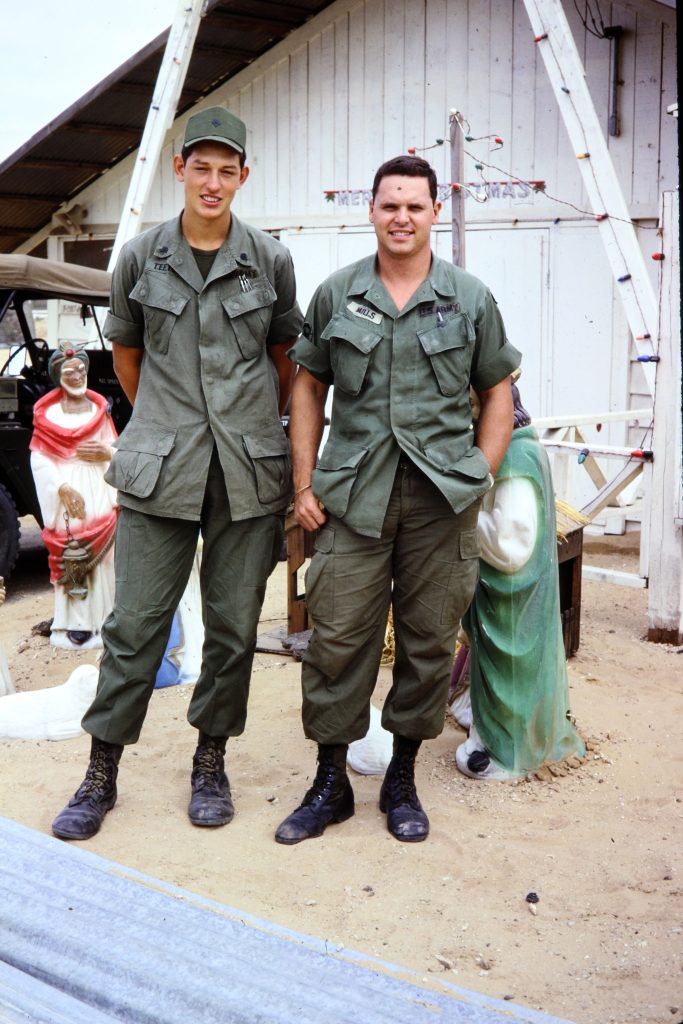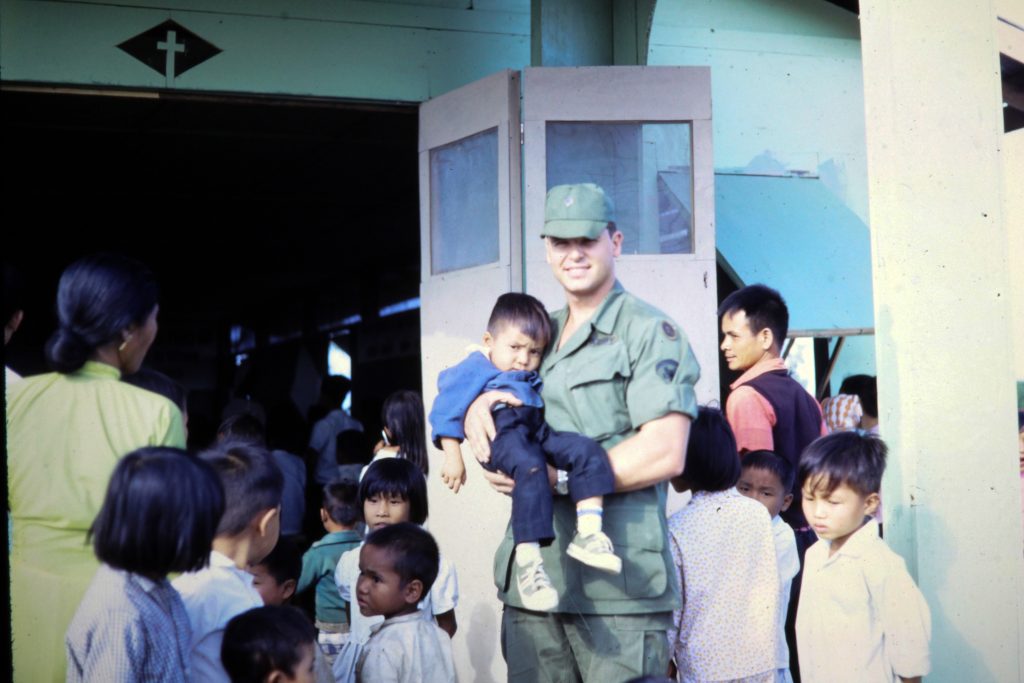Knoxville martial-arts master Pete Mills reflects on his intense service in Vietnam
In October of 1968, Pete Mills, a US Army Private First Class, peered out on unfamiliar fields and marshes as the plane ferrying him touched down in Saigon, halfway around the world from his home in Carter, Tennessee. Having been drafted May 1 of that year, Mills had completed basic training at Fort Bragg, North Carolina, and advanced infantry training in New York.
“When we landed, they rushed us straight to a bunker because we were under fire from rockets and small arms,” Mills recalls. “That was a good way to start things off. Welcome to Vietnam.”
The welcome didn’t get any warmer after that—unless you count the stifling heat and humidity that Mills and his fellow American troops encountered as they fanned out to bases and forward areas throughout the thick Southeast Asian terrain. “We were always soaking wet, it was so hot and humid,” says Mills, who would serve almost 15 months in-country, assigned to battalion level (with five companies underneath it), working in transport and supply, supporting an Army chaplain, and advancing to the rank of Sergeant.
For Mills, a Knoxville martial-arts master, 10th-degree blackbelt, dojo leader, and internationally known instructor who turned 78 this past July, the memories of that “intense, emotional time” in Vietnam more than a half-century ago remain as etched and vivid as many of them are painful.
If You Could Survive the First Three Minutes . . .
Take the multi-day journeys Mills would make across Vietnam as part of convoys transporting supplies—food, water, gas, bullets “and whatever else the troops needed,” he says—to troops in the field, primarily in the Central Highlands, at times coming under enemy fire, staying alert to protect the caravan. “If they could knock out a gasoline truck, it would cause a lot of damage. We had gun trucks that could take small-arms fire, with mounted machine guns, and choppers supporting us in the air. But still, there were a lot of hits.”
If enemy fire struck a gasoline truck, the truck behind it was tasked with pushing the gas truck off the road. “That’s hard to think of, hurting your own people to save the lives of everybody else in that convoy,” says Mills.
At night, the convoy vehicles would “circle up on an air strip somewhere, like an Old West wagon train. You were responsible for what was in front of your vehicle. Someone was on guard all night. If we came under attack, you’d roll out and find somewhere to go quickly. They always had choppers there. If you could survive the first three minutes of rocket fire, a chopper would be in the air—if it hadn’t been hit yet. They had machine guns that could cover the size of a football field and put a bullet in every square foot—tremendous firepower.”
Some of those nights were long and harrowing, and many of Mills’ fellow soldiers were killed or wounded along the way, which brings to his mind another difficult aspect of the war. Because Mills had entered the military as a devout Christian with interest in the ministry, another of his jobs was to shadow an Army chaplain named Tim Tatum on visits to troops. “I supported him in his ministry as his bodyguard and whatever else he needed,” Mills says. In addition to delivering up to 15 different sermons in a given week, Tatum would visit hospitals, chapels, the motor pool—and conduct memorial services for fallen soldiers in the units within the five companies under the battalion (upwards of 1,000 troops).
“It was always painful,” Mills recalls of being part of many of those memorials, often for young men he had served alongside or interacted with on the battlefield.
One morning, he recalls, at a hospital in Cam Ranh Bay, “the VC [Viet Cong] penetrated our guard and threw charges right down the middle of the hospital floor. I was visiting the next day. It was sad to see the savagery of war. These boys already had an eye or a leg missing. On Easter morning, they killed 14 people in the hospital.”
Among the Fortunate Ones
Even as he witnessed so much carnage, Mills felt “lucky” that he was not directly assigned to combat. “We were in supply; the infantry was out looking for the enemy. They had the toughest jobs. If you were, say, a 120-pounder, they’d make you crawl down into tunnels. They would clear them first with hand grenades, but still, it was a dangerous deal.” Mills was “too big for that,” he adds.
The horrors of war inevitably led to (or magnified) problems soldiers had brought with them from back home. “There were divorces—one guy I knew in basic training, his wife left him while we were there—and girls who didn’t wait for their boyfriends to come home. A lot of other guys got married in Vietnam, fell in love, or thought they were in love. The chaplain would say, ‘So, you’re gonna live with her and her family in Vietnam?’ They’d say, ‘Oh no, Chaplain!’ That would make them rethink things.”

Mills wed his wife, Dot, before the war, who supported him all the way through, he says. The couple has now been married 59-plus years and are the parents of a son, Todd, and two grandchildren, Tucker, 10, and Julianna, 6.
Upon arrival in Saigon, Mills “had known about drugs” but not encountered them much. “The first night walking into the hootch [hut shelter] in Vietnam, the smell of marijuana would knock you down,” he says. Alcohol flowed plentifully as well. “Everybody got drunk. A lot of guys would mostly stay drunk through the whole thing.”
In another consequence of war, Mills was among many soldiers exposed to Agent Orange, a tactical herbicide the US military used to clear leaves and vegetation for its operations, primarily along roadways. “Especially people who were in transportation like I was, we faced it every day,” says Mills. “You could smell it in the air. Later, I ended up with diabetes, and I know [Agent Orange] sped it up.” Some health complications remain.
Still, Mills’ memories of Vietnam are not all negative. “We had fun, too,” he says. “We were 18-, 19-, 20-year-old kids—even though I was a little bit older—so we’d laugh, joke, play football.” When he was granted a week of R&R during his service, Mills flew from Vietnam to Hawaii to meet Dot and enjoyed a memorable respite in the islands.
In addition, Mills enjoyed working closely with Chaplain Tatum, and Mills himself was afforded chances to encourage the troops, share his faith, offer solace, and befriend some of the Vietnamese support staff he met as he crisscrossed the country. “They would allow certain Vietnamese to come on post and help with cooking, laundry, and once in a while we’d get an opportunity to share with them,” he says.
Serving in the Army honed his leadership skills and instilled in him the value of “staying with it,” Mills says. “That has been a big thing in my martial arts over the years. You have goals, you have to commit to them and stay with them. I can’t tell you I want to become a world champion, but I’m not gonna train any more this week.”
Looking back, “the military was great for me,” he says. “I made friends and served with some good men. I got to visit Hawaii with my wife. I benefited from the GI Bill, finished my associate’s degree, with some credit for my military service, and earned a master’s. I could not have done that otherwise.”
Even so, coming home in 1969 and the years following—leading to the end of American engagement in 1975 and beyond—was not an easy time for Mills and his fellow vets. As a Knoxville native, Mills’ family “had always respected and been part of the military; we were strong supporters of America,” a foundation that was vital to Mills when he encountered a homecoming that was often more hostile than hospitable.
“We got copies of Stars and Stripes in Vietnam, so we knew about the protests and riots. I remember when I was stationed in New York [in 1968], going to the city and watching all the hippies, the flower children in their VW vans. There was a lot of anger. We had to be careful about wearing our uniforms and go out as groups.
“They would let you into Yankee Stadium free if you were in uniform, but you didn’t always want to wear the uniform. Even back in Knoxville [after his service], we didn’t have everybody liking us. That has changed over the years, and for the most part we are received well now and welcomed home.”

School of Hard Knox
Much of the reason Mills was too big to dive into those tight tunnels in Vietnam was because of his age (he was 23 when he was drafted) and his muscular upbringing in the hills of East Tennessee. Born in 1944 into a family of farmers and “ordinary country folks, I guess,” Mills was active in sports—he played football, ran track, and wrestled at Carter High School—while also excelling in weightlifting. He became interested in mixed martial arts as a young teen, thanks in large part to the influence of his father, Walter, a former Golden Gloves boxer.
When Pete was about 15, his dad taught him boxing and began taking him to the Knoxville Golden Gloves gym at Chilhowee Park to train. Soon the young Mills’ interest expanded from boxing toward martial arts; he learned French footfighting, karate, taekwondo, and more.
During his time in Vietnam in 1968 and 1969, Mills—who had achieved his Black Belt in 1967—was able to train periodically in taekwondo with the Korean Ranger Group in Cam Ranh Bay. After the war, he would parlay his interest and experience into growing a thriving martial-arts business and serving as a national and international leader in the disciplines. One way he has sought to pay it forward is by offering low-cost classes, making martial arts available to all, and counting among his students fellow military veterans.
“One of my students, Chuck, served three tours in Iraq. He was hit twice, and he has a lot of issues with his back, neck, and hands. Another was a staff sergeant in Afghanistan. I get the chance to thank them for their service,” says Mills, who also has trained soldiers—including elite Green Berets—in martial arts, fighting techniques, “how to search a vehicle for drugs, for example. I’ve been to Russia five times, to the Dominican Republic, I went to Israel last year and trained with the Israeli military.”
On July 26, 2016, Mills was inducted into the Greater Knoxville Sports Hall of Fame “for his wide-reaching contributions to mixed martial arts”—an honor that he gladly shared with the many fellow instructors and leaders who have taught, inspired, and supported him over the years.
It was likewise his honor to help defend his nation through the military. “When I look back on it all,” says Mills, “I’m not sorry that I served. I love America, and I would be willing to do it all over again if I had to.”

Comments are closed.